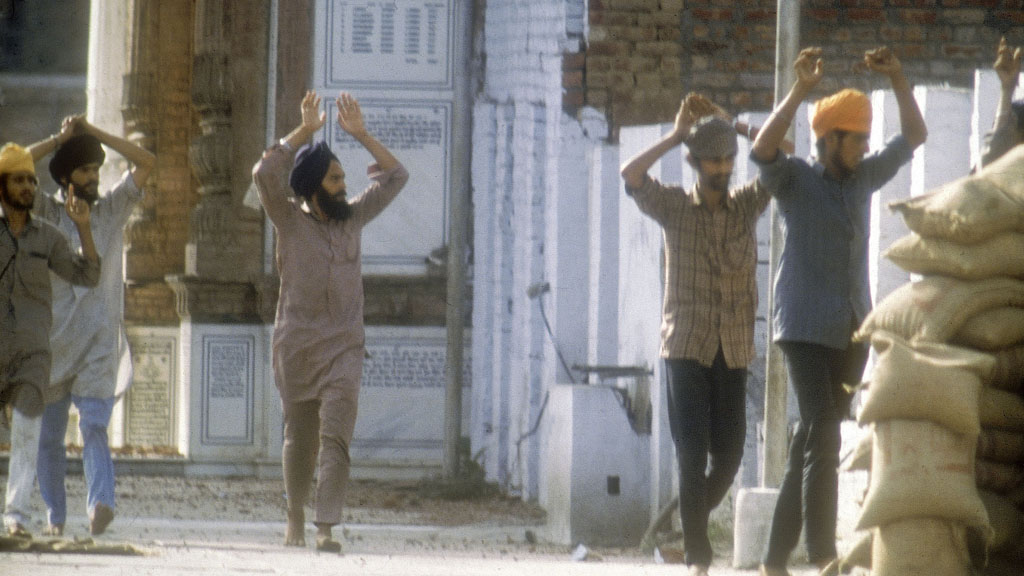UK military ‘had limited advisory role’ in Amritsar
One British military official travelled to India four months before the deadly attack on the Golden Temple, but the Indian authorities failed to follow his advice, an official review finds.

The unnamed advisor, described as a member of the elite SAS in official documents, went to India from 8 to 17 February 1984 after an urgent request for operational advice from the Indian government over the presence of armed Sikh separatists at the temple, William Hague told MPs.
The foreign secretary said the adviser had carried out reconnaissance and recommended the Indian authorities consider carrying out a surprise attack on the holy Sikh shrine using helicopters, but only as a last resort if negotiations with dissidents holed up in the temple broke down.
In the end the Indian Army’s assault on the Golden Temple four months later, named Operation Blue Star, was “fundamentally different” to the plan drawn up with British help, Mr Hague said.
By June 1984 the Sikh separatist leader Jarnail Singh Bhindranwale had gathered more armed supporters and more fortifications had been erected in and around the Sri Harmandir Sahib temple in Amritsar, Punjab.
The Indian Army launched a ground assault without using helicopters. Unconfirmed reports say several thousand civilians died in fighting that raged over five days.

David Cameron ordered the cabinet secretary, Sir Jeremy Heywood, to carry out an urgent review of the Thatcher government’s involvement in the attack after documents released under the 30-year rule revealed an SAS advisory role.
Mr Hague said: “The cabinet secretary’s report finds that the nature of the UK’s assistance was purely advisory, limited and and provided to the Indian government at an early stage; that it had limited impact on the tragic events that unfolded at the temple three months later; that there was no link between the provision of this advice and defence sales and there is no record of the government receiving advance notice of the operation.”
It had been suggested that Britain’s provision of advice was linked to the sale of British-made Westland helicopters to the Indian government, but Mr Hague said the trawl of some 23,000 documents across all government departments had yielded no evidence of a connection with arms deals.
He said there was no evidence of Britain providing any other training or equipment to India ahead of the raid.
In a report published on the Cabinet Office website, Sir Jeremy said he had also concluded that parliament had not been misled over UK involvement in the controversial events.
Sikh leader ‘hugely disappointed’
The chairman of the Sikh Federation, Bhai Amrik Singh, said he was “hugely disappoined” by the “narrow terms” of Sir Jeremy’s inquiry, which focused on events that led up to the storming of the temple but excluded the aftermath of the event.
A few months later the country’s prime minister, Indira Gandhi, was assassinated by two Sikh bodyguards in what was widely regarded as a revenge attack, leading to outbreaks of violence against Sikhs.
In a letter to the prime minister, Mr Singh wrote: “We are dismayed the terms of the review were only formally made available almost three weeks after the review was announced and only days before an announcement of the results of the review are expected in Parliament.
“It appears the review has looked at a narrow period and not covered the period in the latter half of 1984 and may not have addressed some of the concerns raised by UK politicians in the last three weeks, e.g. threat of sanctions by India against the UK, Germany, Canada and USA towards the end of 1984 for sympathising with Sikhs in the Diaspora.
“From the outset you have emphasised the need for transparency, but the significant delay in sharing the terms and that they appear to have been changed for political reasons does not bode well with such assertions and your emphasis on the speed of the review.”